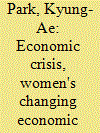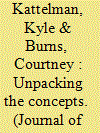|
|
|
Sort Order |
|
|
|
Items / Page
|
|
|
|
|
|
|
| Srl | Item |
| 1 |
ID:
106016


|
|
|
|
|
| Publication |
2011.
|
| Summary/Abstract |
Although many studies have analyzed the gendered impact of economic crisis, few have examined the case of North Korea. This article will explore how North Korea's economic crisis caused changes in women's economic participation. It will also analyze the impact of these new economic roles on the lives of women, and examine the broader implications of these roles for the status of women in North Korea. The North Korean economic crisis changed the pattern of women's economic participation, pulling women out of the formal labor market and driving them into the informal private economic sector. It also forced a number of women to leave their homeland in order to provide support for their own and their families' livelihoods. The new economic roles women have assumed in the wake of the food crisis have affected women's lives in many negative ways, resulting in an increase in their workloads, as well as an increase in the amount of sexual violence and stress of family breakdowns they experience. At the same time, however, these new roles have given women stronger voices in family decision-making matters and allowed them to develop, to some degree, a sense of self-consciousness and awareness of their own rights. Nevertheless, the fact that women have been engaged in new economic activities does not imply that they also have a high likelihood of advancing their socioeconomic status. To the contrary, women's defection from their homeland does not allow them to voice their opinions in matters related to the existing gender inequalities. Moreover, North Korean women are not considered capable of forming a critical mass, as they lack economic, social, political, and organizational resources to collectively voice their discontent. Furthermore, the neo-Confucian tradition of male superiority that is still firmly entrenched in the society is a major barrier that remains to be overcome.
|
|
|
|
|
|
|
|
|
|
|
|
|
|
|
|
| 2 |
ID:
192874


|
|
|
|
|
| Summary/Abstract |
In this article, we examine how changes in the status of women affect the intensity of terrorism by using three novel approaches. First, we link terrorist ideology more directly to women’s status using a well-tread topic in feminist literature that is rarely applied to political violence: misogyny. Second, we provide more explicit linkages to misogyny by disaggregating terrorist ideology into four typologies (ethnonationalist, religious, right-wing, and left-wing), arguing that the first three have strong themes of masculinity and patriarchy; ideologies when taken to their extremes distill into misogyny. Finally, previous efforts to study gender equality frequently suffer from imprecise theory and concept stretching. We sidestep this issue by instead focusing on women’s status and employ a new series of measures that broaden our understanding of women’s status from a rights-based approach to one that includes women’s security, inclusion, and legal rights. We do this by disaggregating 634 terrorist organizations to determine whether the level of specific women’s status indicators affects the frequency of violence from specific terrorist ideologies. We test this on a sample of 185 countries from 1970 to 2014 and find that increases in women’s security provoke violence from ethnonationalist and religious groups while increases in women’s legal rights incite violence from right-wing groups.
|
|
|
|
|
|
|
|
|
|
|
|
|
|
|
|
|
|
|
|
|